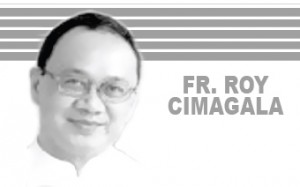WHILE we always have to use it, we have to understand that we just cannot be completely guided by common sense, or what some people refer to as “what comes naturally.†Our common sense would not be enough to cope with all the situations and issues we can encounter in life.
Especially these days when things are getting increasingly complicated, we need to see to it that we are adequately equipped to tackle the challenges of the times. There are many developments taking place from all sides, political, economic, social, technological, etc., and we just have to know how to grapple with them with some degree of competence.
We cannot be indifferent to these developments. Rather we should feel a great responsibility to direct the course of these developments in a way that is proper to our dignity as persons and as children of God. We are supposed to be masters of time and history.
Now that we are facing powerful ideological forces that are not anymore shy in admitting to be godless, we have to know how to have a handle on this very exciting situation.
No, we cannot solely rely on our common sense simply because it only has a limited range of capabilities. It usually can cope with situations that only require instinctive reactions or those with which we are already most familiar and that call for more or less routine responses only.
And though we can enrich it, as we should, as we go along in life, we have to understand that our common sense is by nature subjective and highly relative. It comes as a result of our exposure to the different things in life and our experiences, and is conditioned by our upbringing, our temperament, our social and cultural milieu, etc. That’s why what is commonsensical to one may not be so to another.
Besides, our common sense usually cannot penetrate into the more subtle, complex things in life, and much less, the spiritual and supernatural aspects. The ideal, of course, is to have our common sense already completely infused with the impulses of faith, hope and charity, but that will always be a lifelong quest, requiring heroic efforts.
We need to overcome our tendency to simply rely on our common sense. Without, of course, ignoring it, we need to go beyond it. We should not make it the status quo of our thinking.
We have to study and take up the lifelong journey of knowing more and more things, especially the doctrine of our faith that in the end is the ultimate source of knowledge for us, of what is good and proper to us, of what would bring us to our ultimate end, our eternal life.
Thus, we have to realize that our thinking, judging and reasoning should be theological. That is to say, it should not be simply be based on what we see, feel, understand with our reason alone. It should always consider the inputs of faith.
This means that we have to be reflective in our thoughts and reactions. We have to overcome our tendency simply to be spontaneous and driven only by the impulses of our instincts, emotions and tentative understanding of thngs.
There is a need to study the truths of our faith, meditating on them and figuring out, perhaps with the help of a spiritual director, how these truths can be incarnated in our attitudes, thoughts, intentions, words, feelings and emotions, and actions. The ideal would be if these truths of our faith become the very instincts of our behaviour.
Let us enrich our common sense with these truths. That is why it would be good if together with the mundane concerns all of us have, we would know how to incorporate in our daily, weekly, monthly schedules, etc., a plan for continuing formation, involving time to study, to pray and meditate, and to attend to some means of formation.
Then let us develop virtues which will always be an ongoing affair for us. We can never say we are virtuous enough. As St. Augustine once said, the moment we say enough, we would already have retrogressed in our spiritual and moral life.
Let us be clear about this need, and avoid a cavalier attitude toward it, something that, sad to say, is rampant nowadays, even among those who can be considered as highly educated.
Let’s take this as a very personal concern that we ought to share with the others, especially within the family, and then with friends, relatives, colleagues, etc. Let’s raise our common sense to the level of faith, hope and charity.

